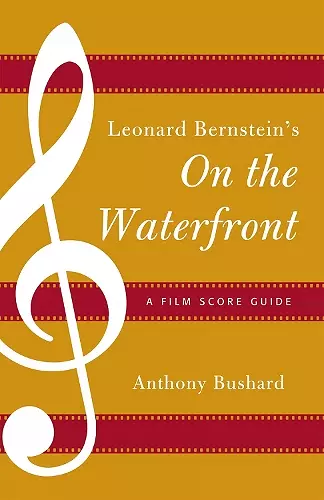Leonard Bernstein's On the Waterfront
A Film Score Guide
Format:Paperback
Publisher:Scarecrow Press
Published:27th Dec '12
Currently unavailable, and unfortunately no date known when it will be back

Released in 1954, On the Waterfront is considered one of the greatest films of all time, winning eight Academy Awards—including Best Picture—and placing in the top 20 on the American Film Institute’s 100 Films survey. The film’s Oscar-nominated score represented a rare venture into film music composition by Leonard Bernstein, one of the towering figures of classical music in the 20th century. In Leonard Bernstein’s On the Waterfront: A Film Score Guide, Anthony Bushard examines this landmark work, a score that continues to influence composers of film and classical music alike. The book begins with a biographical survey of Bernstein’s work, followed by an exploration of Bernstein’s compositional method, a look at the context of the film, and an analysis of the score itself. Though other volumes have focused on Bernstein’s overall career, Bushard's book is the first to look specifically at the score of this film. A welcome examination of one of Bernstein’s most accomplished works, Leonard Bernstein’s On the Waterfront: A Film Score Guide highlights the invaluable contributions of this great composer and will be appreciated by fans of classical music and film scores.
Bushard (music history, U. of Nebraska, Lincoln) presents a musicological and sociological analysis of Leonard Bernstein's one and only film score that he wrote for On the Waterfront. Half of the book is devoted to biographical and social contextualizing, which Bushard argues is important to understand the true merits and influence of Bernstein's score. To this end, he reviews Bernstein's musical and dramatic background prior to making the film, outlines the significance of anti-communism in the life of Bernstein and the film's director, Elia Kazan, and interrogates the existential crises that the Cold War and suburban flight generated. Two chapters focus on the score or directly musical considerations itself: the second chapter, which considers Bernstein's compositional method, and the last chapter that analyzes the score piece by piece. Because of the context Bushard provides, this text could be useful in a class on cultural or film history, while the analysis itself will be of interest to people with musical training. * Book News, Inc. *
ISBN: 9780810881372
Dimensions: 215mm x 141mm x 18mm
Weight: 318g
234 pages